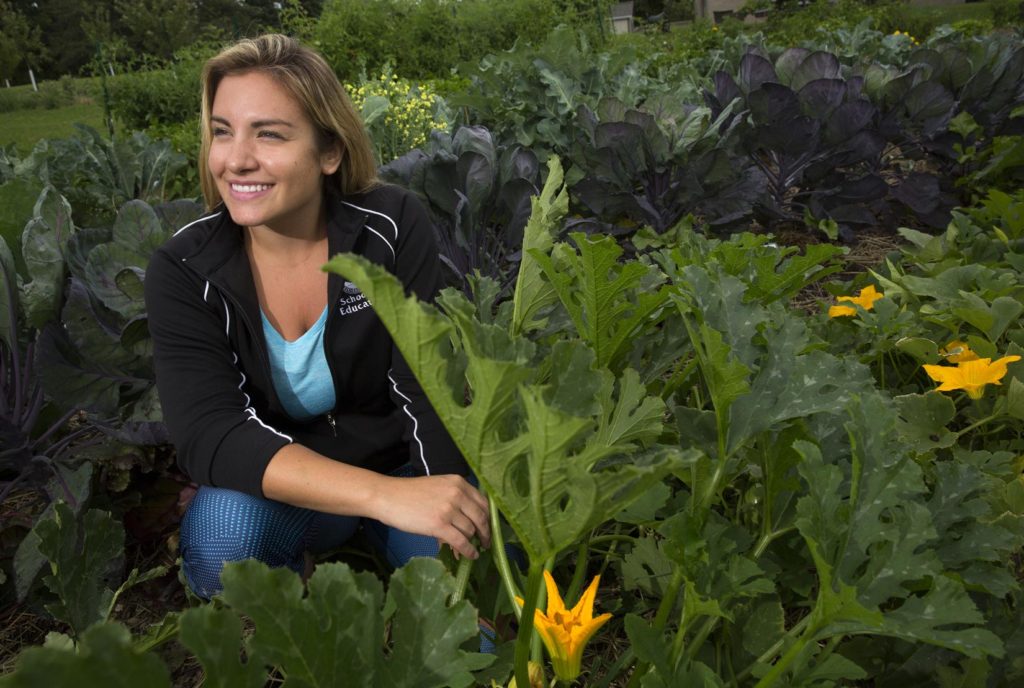
UW-Whitewater graduate student and classroom teacher in the Adams-Friendship School District, Heather Gayton on Friday, August 11, 2017, at the UW-Whitewater campus garden.
When classes resume in September at Adams-Friendship Elementary School, fifth-grade teacher Heather Gayton will be more than ready to welcome her new students. She already memorized their names.
Over the summer, she spent time at her students’ baseball games, met with them on the playground, familiarized herself with their tastes in music, and identified ways to motivate them to learn once they return from summer break.
“Teaching to me is all about providing personal programming — to find out what each of my students needs to be successful and inspiring them. That’s what I want my legacy to be.”
In the meantime, she’s back in school herself, working on earning a master’s degree at the University of Wisconsin-Whitewater, excited to apply the lessons she’s learning in college in her own classroom.
Gayton, from Random Lake, Wisconsin, chose UW-Whitewater’s program because it offers licensure and is flexible — most courses can be taken in a hybrid format: mostly online, with a few face-to-face meetings. She’s enrolled in the professional development program with an emphasis on challenging advanced learners.
Her adviser, Pamela Clinkenbeard, a professor of educational foundations, has helped Gayton reach one of those “aha” moments regarding gifted education — programming and services generally reserved for smarter and more talented students.
“It’s not just for advanced kids. The principles and teaching tactics we use can help all kinds of students access what they’re best at and open new avenues of learning,” Gayton said. “For example, students from low socio-economic and diverse backgrounds may not have had the same support or opportunities as other students. They have gifts and talents we haven’t recognized yet.”
At Adams-Friendship Elementary School, Gayton is known for immersing her students in agriculture science. The .25-acre garden plot she and her students manage is filled with zucchini, cantaloupes, watermelon and sunflowers.
It’s an outdoor laboratory where students learn more than just how to grow food; they learn about self-sufficiency, nutrition and land preservation.
Pest control is more engaging to her students than weed pulling, Gayton joked, and she said they love to see strange-looking insects in the garden.
Plus, the garden helps Gayton introduce profound concepts about life in a way that’s accessible to a 10 year old.
“They see that a plant will die if you don’t water it,” she said. “And if something doesn’t grow as expected despite our best efforts, we talk about the importance of persistence and trying again, and learning from failure.”
This year, she’s working on an aquaponics system — growing fish and plants together — stocked with trout, perch and goldfish.
From the county extension office to the state’s Master Gardener Program, Gayton has built a network of resources for her classroom. She has written and won several grants and used World Dairy Expo tours, science fairs and other hands-on activities to enhance her students’ learning experiences.
Her efforts have not gone unnoticed.
Last year, Gayton was selected by members of the Wisconsin Farm Bureau’s Agriculture in the Classroom program as the winner of the Outstanding Teacher Award.
This year, she won the National Science Teachers Association’s DuPont Pioneer Excellence in Agricultural Science Education Award, which honors a K-12 science teacher who incorporates innovative agricultural science activities into their existing science curriculum.
For Gayton, it’s simply about doing what she loves and instilling that same passion in her students.
“It’s a humbling profession. You always remember your fifth-grade teacher.”
